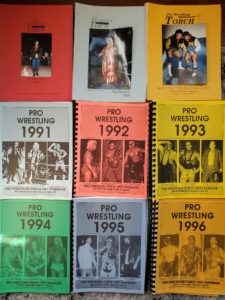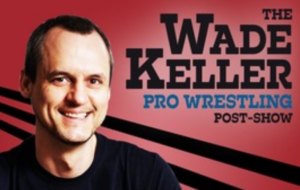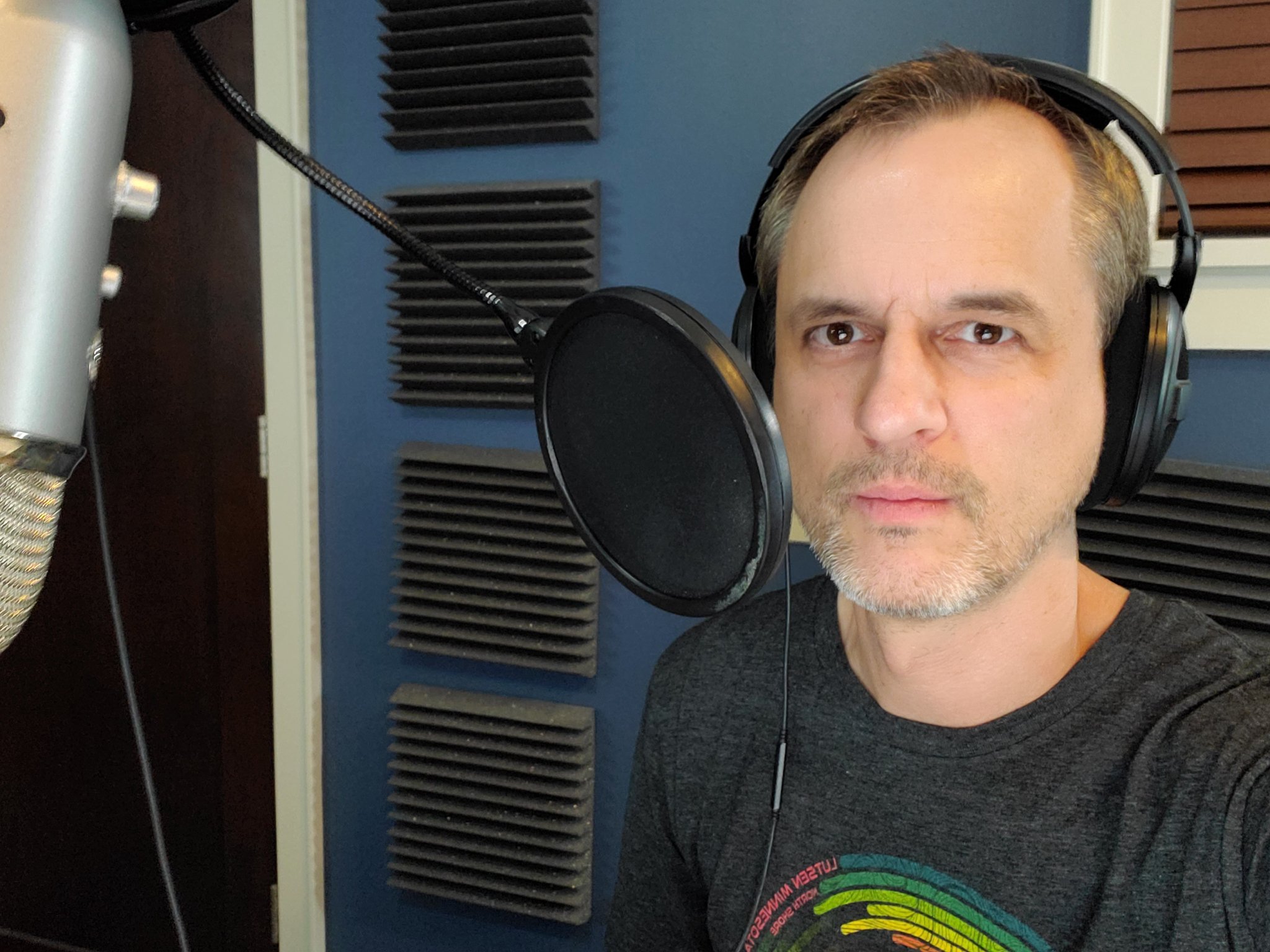In part two of this 1991 interview, Pro Wrestling Torch editor Wade Keller talks about incorporating interviews into his relatively new newsletter. The interviews were a feature that set the Torch apart from The Wrestling Observer.
KELLER: I decided to start doing interviews. I thought that would be good because there weren’t any in wrestling, and it would be a real challenge to get people to talk to me. The first interview I did was with an independent wrestler from Minnesota–Tommy Ferrara. I did Verne Gagne next, which was a big interview. He didn’t quite know who he was talking to. He was shocked by some of the questions I asked him. In the middle of the interview, he goes, “Who exactly are you again?” I don’t think the person who set up the interview exactly explained to him who I was. And from there it’s boomed. It’s really been a good thing for the newsletter. It’s really set me apart, because other newsletters don’t do interviews as regularly as I do.
Usually, people I talk to know exactly who I am and what I’m looking for in the interview. If they give me their b.s., I just say, “No, really.” If they agree to do an interview with me, usually they’re people I know, who I’ve talked to before, and they know not to b.s. me. It would stand out, and I wouldn’t print it. I’ve never had a problem with that. People are really open. I mean, announcer Jim Ross almost got fired from TBS for doing the interview with me. He said, “There’s legitimate press out there, and I’m gonna talk to them. And if the company wants to give me heat for it, that’s fine. Hopefully I’m good enough that that won’t be an issue.” So, you know, that got him in trouble.
I mailed out over a thousand copies this last issue, but I did some freebies. That’s about what it is. With the phone calls and the traveling and the computer I had to buy specifically for this, and that sort of thing, it’s really so far been a break-even thing. I’d say in 1991 I’ve got a chance to make some pretty decent money. I mean, by the time I graduate from college in two years, the three years of investment could really pay off, and I could be making some really, really good money. Better than I could get in any entry-level job. So I feel pretty good about that.

I guess right now, I’m more looking at journalism than I am at getting involved in the business, although that’s certainly an option. I mean, I hope that I’m learning a lot about it where I’d be qualified to do something in the office someday. But, you know, there’s always the stigma: if you haven’t been a wrestler, then you don’t know anything about it. I get that a lot doing the newsletter: “Well, if you’ve never been in the ring, how can you grade a match?”
“Well, if you’re wrestling in a match, how can you grade what a fan’s perspective is?” That’s my response. I mean, it might be real fun to play, but it might be real boring to watch. I don’t think the wrestlers are right to judge if their match is good or not from a fan’s perspective, but that’s the kind of stuff you get from people sometimes.
When wrestling promotions are making money, they’re open. When their jobs are threatened, and the truth hurts, they close up. Jim Herd–he’s the Executive Vice-President of World Championship Wrestling–has totally closed his door to me. The WWF doors are always closed when it comes to on-record stuff. There’s always people who will say some stuff off-record, but not really too much. WCW, at times, is really good about it. I still talk with people in the company, but Jim Herd always used to return my calls, and he doesn’t return mine anymore.
Wrestling’s the way it is because of cable television and the idea that promoters can make tons of money off of the idea of pay-per-views, and making so much money for one show has attracted people like Ted Turner into buying a promotion. It gets good ratings for the amount of money it costs. And then pay-per-view came into the picture, and promotions, at this point, just center everything around pay-per-view, promoting it, just basically trying to convince fans to spend twenty bucks at one time to sit in their home, and all the promoters have is the expense of one big show.
Right now, steroids are a problem, and that’s gonna change a lot of things, or at least it could. The promoters are basically steroid pushers, by [the] fact that they give the most money to big people at the top of the promotion. Lex Luger’s the world champion at WCW, Sting is the second-highest-paid wrestler in the promotion, and the Steiners–one of them for sure is totally heavy and the other guy has had some reasonable cycles. But the top four guys in that promotion with all the title belts, and their TV champion “Stunning” Steve Austin, they’re all huge, huge people who use some sort of artificial substance, no question about it. When you’re on the road two-hundred-plus days a year, if all you did was work out eight hours a day and ate totally correctly, yeah, you could look like that. But with a wrestler’s schedule, you couldn’t look like Lex Luger without drugs.

The WWF, they’re worried about their image as being family entertainment, so they’re dealing with it now, through saying they’re gonna do steroid testing. But, you know, it’s probably gonna be the promoter’s aunt who runs the “independent” firm that tests. It’s gonna be totally a farce. So I just can’t imagine the WWF actually doing steroid testing until ten years from now, when wrestlers start dropping like Superstar Graham, having ankles fused and bones taken from your hip to replace things. It’s a totally degenerative drug. Livers can go in these people. It’s a real dangerous drug. Promoters can make money off the wrestlers, and the effects on the wrestler are so delayed that the promoters will never feel it. Unless they get sued, and Superstar Graham is suing Vince McMahon, or at least announcing he’s going to sue McMahon. So either way, Vince is going to get sued and lose, or get sued and win and take the chance, one of the two. Or he’s gonna do an out-of-court settlement with Superstar Graham, so there’s no publicity, which will mean that every former wrestler in the WWF who’s having problems is gonna come to Vince and do an out-of-court settlement. And he’s gonna be out a lot of expenses. So Vince is in a tight spot.
WCW is just driving themselves into the ground. They’re so mismanaged. It’s just an old-boys’ network, with Dusty Rhodes and all his cronies. Jim Herd, the Executive Vice-President, he was in the pizza business before, and he was bad at that. He’s in wrestling now and couldn’t be worse. He knows nothing about the business and then interjects his opinion consistently into what should be done, and that’s just killing the group. I think by the end of the year they’re gonna realize there needs to be major changes.
Dusty Rhodes, as booker, is doing a terrible job. I think he’s just trying to earn some money so he can then retire and wait another five years until a promotion makes a real dumb decision and hires him. He’s been successful at times, but he totally has absolutely no concept today of how to promote nationally. For example, angles that he used [before] to promote, he’s now rehashing, bringing them back and doing the exact same thing. He’s turned five or six different people in the last two weeks from face to heel or heel to face to try to get things going and TV ratings up. Instead of making each turn mean something and really developing it, he does it the lazy way. He turns everyone and gets the same effect. The problem is, when you turn everyone, you’re stuck for three years because you can’t turn anyone again, and no one’s gonna buy it. Whereas turns should occur every three to six months and really mean something. Dusty would rather hotshot his way through his contract and try to get a renewal when the time comes.
I don’t think anyone has the right to say–well, they have the right to say, but I think they’d be wrong–that wrestling fans typically are lower class than other fans. I mean, when I go to sports bars and see a football game on TV, it’s the same crowd that I see at the bars for the wrestling. You know, it’s a bunch of guys guzzling beer, using swear words, and calling people all these stereotypical names and loving it. Non-fans assume when they see the homophobic and racist angles, that the fan watching is into that, when, in fact, the crowds of eight hundred people in 18,000-seat buildings for WCW reflects something different–that what the wrestling promoters are presenting is not what the fans want. For a while, wrestling promotions provided a lot of hot action, angles that made sense, and the negatives, homophobia and that sort of thing. Now they’ve dropped the good wrestling part and just present gimmicks, cartoon characters, racist stuff. That’s not drawing.

There’s wrestling fans out there who want a smart person to run a wrestling business. Unfortunately, the WWF is run by smart people who have a different perception of what they want to do, which is marketing, which is where the most money is. But there should be an alternative to the cartoon, which would provide a quality wrestling product. And WCW is in the current position to provide it with their exposure, and instead they try to copy the WWF, but they’ll never do a good enough job, and they’ll always be perceived as minor league because of it.
The only reason I’m probably more into wrestling than I’m into hockey–I’m a huge hockey fan–is because my friends when I grew up were more into wrestling than anything else. There’s something about wrestling that I like a little bit more than anything else. But if wrestling disappeared off the face of the earth, I’d probably get really into hockey. I don’t think there’s anything specific about wrestling that really hypnotizes me into thinking, “Wow, I need to watch this.” I don’t think it’s anything strange. I think it’s just the addiction to the soap opera of it, and that’s what I get into with reading sports sections. There’s so much about sports that I like, and it’s behind-the-scenes stuff that I like just as much as the actual action. I think what sustains my interest in wrestling is the fact that I get to write about it. I really like the challenge of getting the truth out and doing a good job with it, and entertaining people while still covering it.
Thoughts from 2022: I’m glad Mr. Keller has been able to make what seems to have been a pretty good living as a wrestling journalist for the past thirty years and didn’t have to resort to a hockey-related career.

